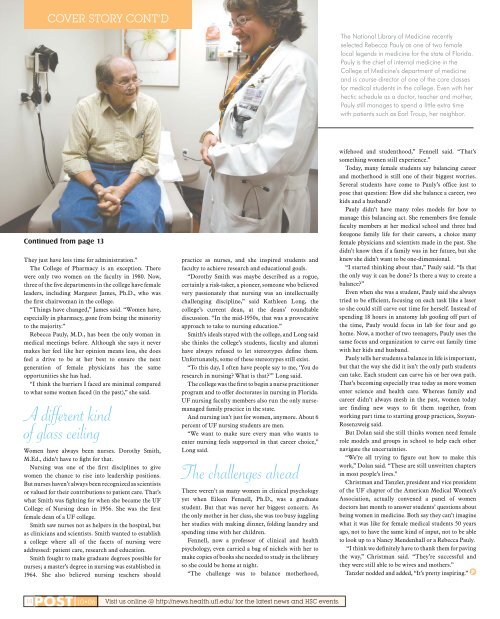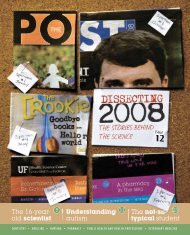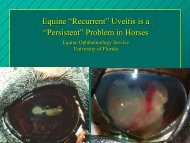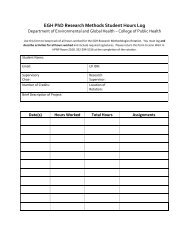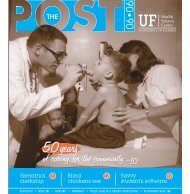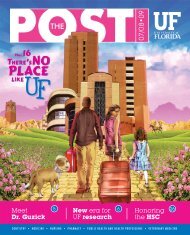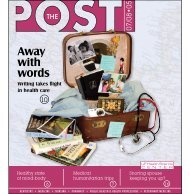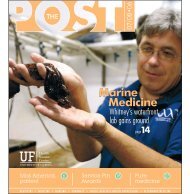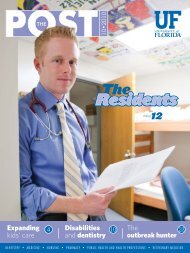Through the ceiling Through the ceiling - UF Health Podcasts
Through the ceiling Through the ceiling - UF Health Podcasts
Through the ceiling Through the ceiling - UF Health Podcasts
Create successful ePaper yourself
Turn your PDF publications into a flip-book with our unique Google optimized e-Paper software.
COVER STORY CONT’D<br />
The National Library of Medicine recently<br />
selected Rebecca Pauly as one of two female<br />
local legends in medicine for <strong>the</strong> state of Florida.<br />
Pauly is <strong>the</strong> chief of internal medicine in <strong>the</strong><br />
College of Medicine’s department of medicine<br />
and is course director of one of <strong>the</strong> core classes<br />
for medical students in <strong>the</strong> college. Even with her<br />
hectic schedule as a doctor, teacher and mo<strong>the</strong>r,<br />
Pauly still manages to spend a little extra time<br />
with patients such as Earl Troup, her neighbor.<br />
Continued from page 13<br />
They just have less time for administration.”<br />
The College of Pharmacy is an exception. There<br />
were only two women on <strong>the</strong> faculty in 1980. Now,<br />
three of <strong>the</strong> five departments in <strong>the</strong> college have female<br />
leaders, including Margaret James, Ph.D., who was<br />
<strong>the</strong> first chairwoman in <strong>the</strong> college.<br />
“Things have changed,” James said. “Women have,<br />
especially in pharmacy, gone from being <strong>the</strong> minority<br />
to <strong>the</strong> majority.”<br />
Rebecca Pauly, M.D., has been <strong>the</strong> only woman in<br />
medical meetings before. Although she says it never<br />
makes her feel like her opinion means less, she does<br />
feel a drive to be at her best to ensure <strong>the</strong> next<br />
generation of female physicians has <strong>the</strong> same<br />
opportunities she has had.<br />
“I think <strong>the</strong> barriers I faced are minimal compared<br />
to what some women faced (in <strong>the</strong> past),” she said.<br />
A different kind<br />
of glass <strong>ceiling</strong><br />
Women have always been nurses. Dorothy Smith,<br />
M.Ed., didn’t have to fight for that.<br />
Nursing was one of <strong>the</strong> first disciplines to give<br />
women <strong>the</strong> chance to rise into leadership positions.<br />
But nurses haven’t always been recognized as scientists<br />
or valued for <strong>the</strong>ir contributions to patient care. That’s<br />
what Smith was fighting for when she became <strong>the</strong> <strong>UF</strong><br />
College of Nursing dean in 1956. She was <strong>the</strong> first<br />
female dean of a <strong>UF</strong> college.<br />
Smith saw nurses not as helpers in <strong>the</strong> hospital, but<br />
as clinicians and scientists. Smith wanted to establish<br />
a college where all of <strong>the</strong> facets of nursing were<br />
addressed: patient care, research and education.<br />
Smith fought to make graduate degrees possible for<br />
nurses; a master’s degree in nursing was established in<br />
1964. She also believed nursing teachers should<br />
practice as nurses, and she inspired students and<br />
faculty to achieve research and educational goals.<br />
“Dorothy Smith was maybe described as a rogue,<br />
certainly a risk-taker, a pioneer, someone who believed<br />
very passionately that nursing was an intellectually<br />
challenging discipline,” said Kathleen Long, <strong>the</strong><br />
college’s current dean, at <strong>the</strong> deans’ roundtable<br />
discussion. “In <strong>the</strong> mid-1950s, that was a provocative<br />
approach to take to nursing education.”<br />
Smith’s ideals stayed with <strong>the</strong> college, and Long said<br />
she thinks <strong>the</strong> college’s students, faculty and alumni<br />
have always refused to let stereotypes define <strong>the</strong>m.<br />
Unfortunately, some of <strong>the</strong>se stereotypes still exist.<br />
“To this day, I often have people say to me, ‘You do<br />
research in nursing What is that’” Long said.<br />
The college was <strong>the</strong> first to begin a nurse practitioner<br />
program and to offer doctorates in nursing in Florida.<br />
<strong>UF</strong> nursing faculty members also run <strong>the</strong> only nursemanaged<br />
family practice in <strong>the</strong> state.<br />
And nursing isn’t just for women, anymore. About 6<br />
percent of <strong>UF</strong> nursing students are men.<br />
“We want to make sure every man who wants to<br />
enter nursing feels supported in that career choice,”<br />
Long said.<br />
The challenges ahead<br />
There weren’t as many women in clinical psychology<br />
yet when Eileen Fennell, Ph.D., was a graduate<br />
student. But that was never her biggest concern. As<br />
<strong>the</strong> only mo<strong>the</strong>r in her class, she was too busy juggling<br />
her studies with making dinner, folding laundry and<br />
spending time with her children.<br />
Fennell, now a professor of clinical and health<br />
psychology, even carried a bag of nickels with her to<br />
make copies of books she needed to study in <strong>the</strong> library<br />
so she could be home at night.<br />
“The challenge was to balance mo<strong>the</strong>rhood,<br />
wifehood and studenthood,” Fennell said. “That’s<br />
something women still experience.”<br />
Today, many female students say balancing career<br />
and mo<strong>the</strong>rhood is still one of <strong>the</strong>ir biggest worries.<br />
Several students have come to Pauly’s office just to<br />
pose that question: How did she balance a career, two<br />
kids and a husband<br />
Pauly didn’t have many roles models for how to<br />
manage this balancing act. She remembers five female<br />
faculty members at her medical school and three had<br />
foregone family life for <strong>the</strong>ir careers, a choice many<br />
female physicians and scientists made in <strong>the</strong> past. She<br />
didn’t know <strong>the</strong>n if a family was in her future, but she<br />
knew she didn’t want to be one-dimensional.<br />
“I started thinking about that,” Pauly said. “Is that<br />
<strong>the</strong> only way it can be done Is <strong>the</strong>re a way to create a<br />
balance”<br />
Even when she was a student, Pauly said she always<br />
tried to be efficient, focusing on each task like a laser<br />
so she could still carve out time for herself. Instead of<br />
spending 18 hours in anatomy lab goofing off part of<br />
<strong>the</strong> time, Pauly would focus in lab for four and go<br />
home. Now, a mo<strong>the</strong>r of two teenagers, Pauly uses <strong>the</strong><br />
same focus and organization to carve out family time<br />
with her kids and husband.<br />
Pauly tells her students a balance in life is important,<br />
but that <strong>the</strong> way she did it isn’t <strong>the</strong> only path students<br />
can take. Each student can carve his or her own path.<br />
That’s becoming especially true today as more women<br />
enter science and health care. Whereas family and<br />
career didn’t always mesh in <strong>the</strong> past, women today<br />
are finding new ways to fit <strong>the</strong>m toge<strong>the</strong>r, from<br />
working part time to starting group practices, Stoyan-<br />
Rosenzweig said.<br />
But Dolan said she still thinks women need female<br />
role models and groups in school to help each o<strong>the</strong>r<br />
navigate <strong>the</strong> uncertainties.<br />
“We’re all trying to figure out how to make this<br />
work,” Dolan said. “These are still unwritten chapters<br />
in most people’s lives.”<br />
Christman and Tanzler, president and vice president<br />
of <strong>the</strong> <strong>UF</strong> chapter of <strong>the</strong> American Medical Women’s<br />
Association, actually convened a panel of women<br />
doctors last month to answer students’ questions about<br />
being women in medicine. Both say <strong>the</strong>y can’t imagine<br />
what it was like for female medical students 50 years<br />
ago, not to have <strong>the</strong> same kind of input, not to be able<br />
to look up to a Nancy Mendenhall or a Rebecca Pauly.<br />
“I think we definitely have to thank <strong>the</strong>m for paving<br />
<strong>the</strong> way,” Christman said. “They’re successful and<br />
<strong>the</strong>y were still able to be wives and mo<strong>the</strong>rs.”<br />
Tanzler nodded and added, “It’s pretty inspiring.” P<br />
14<br />
POST 10•06 Visit us online @ http://news.health.ufl.edu/ for <strong>the</strong> latest news and HSC events.


